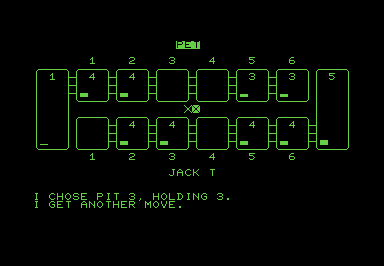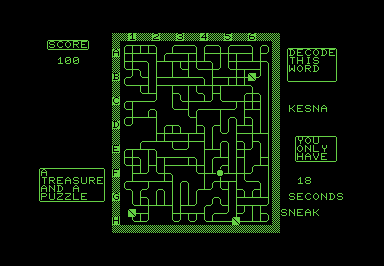CURSOR #22 – September 1980

COVER
Author: George MacRae
Original file name: COVER22!
PRG file: cover22.prg
This month's cover animation is called "The Waves of Change?". I'm not sure why the title is expressed as a question. The little plunger on the left moves up and down, appearing to create a sinusoidal wave effect in a rope made up of quarter-square PETSCII graphics. The animation is a bit slow, but feels fluid.
Pressing SPACE takes you to the table of contents for the issue.

KALAH
Author: Dale Cooper
Original file name: KALAH
PRG file: kalah.prg
KALAH is a solid implementation of the board game
Mancala. The gameplay is pretty
smooth for a BASIC game and the PET opponent is tough. Unless you're an expert player,
you'll have to think carefully about your moves or you'll get steamrolled by the computer.

POKER
Author: David A. Hook
Original file name: POKER
PRG file: poker.prg
In POKER, you play
poker
against the "heartless dealer"—the Commodore PET.
Having the list of the odds and payouts on screen is helpful when you are trying to maximize your
winnings. Betting on hand after hand gets boring after awhile, but with patient play, I was able
to walk away with a small profit.

MATCH
Author: George MacRae
Original file name: MATCH
PRG file: match.prg
MATCH is a variation of the matching game
Concentration, only instead
of matching pictures, you have to find pairs of numbers that add up to a target sum. You can play
with up to four human players or against the PET. You can control the difficulty of the computer
opponent, granting it perfect recall or limiting it to random guesswork.
The flyer provides instructions for adjusting the difficulty of the game by making changes to parameters in the BASIC code. As with many of the programs on these tapes, if a BASIC program didn't suit your exact needs, you were encouraged to go "under the hood" and make changes yourself.

THUNT!
Author: Chris Torkildson
Original file name: THUNT!
PRG file: thunt.prg
THUNT! is short for TREASURE HUNT, which would be a completely reasonable
file name for a PET game but the staff at CURSOR preferred compact names. The player
navigates through a maze, looking for treasure while avoiding the robot enemies. The game adds
a "stealth" mechanic: if you are "seen" by one of the robots, they get bonus moves while you
are frozen in place. When you find the treasure, you have to unscramble a secret word before
finding the exit.
All of these game design ideas look good on paper but the implementation feels uneven. The game appears to freeze whenever you are seen and getting yourself unstuck from a cycle of failed stealth checks can be frustrating. The scrambled-word puzzles, while a novel idea, are not well thought-out. I had to unscramble the letters K E S N A. Inspired by the stealth mechanic, I tried "SNEAK" as a solution but failed the puzzle because the PET was expecting "SNAKE".

COMPARE
Author: Glen Fisher
Original file name: COMPARE
PRG file: compare.prg
COMPARE is a programming utility that reads two BASIC programs from the 2040 disk
drive and outputs a list of line-by-line differences without disturbing the current program in RAM.
This kind of utility would have been invaluable at the time it was published. There was no GitHub
back then—your version control was typically limited to saving multiple copies of your work
in progress (v1, v2, v3...) as you wrote your programs. After a while, disk directories tended to
get messy and it was hard to keep track of what changes were in which version of the program.
The output of COMPARE is similar to that of UNIX's diff command,
showing lines changed, added, and deleted between the two files.
